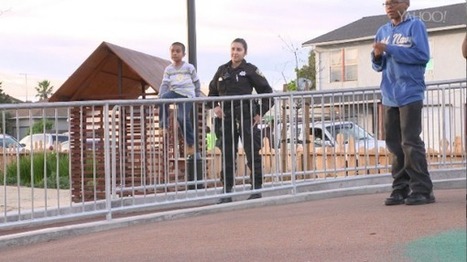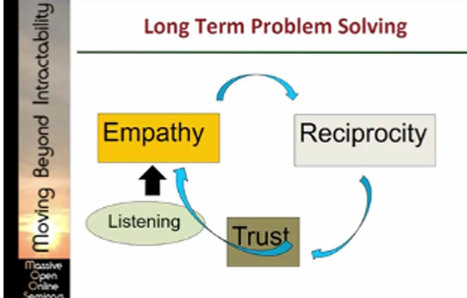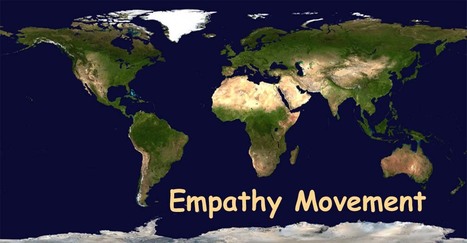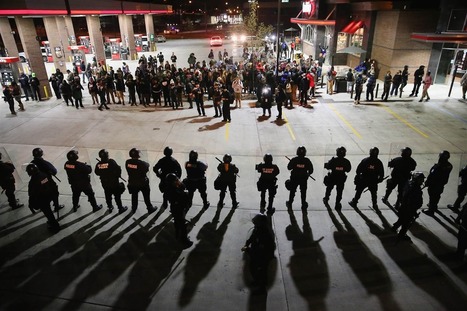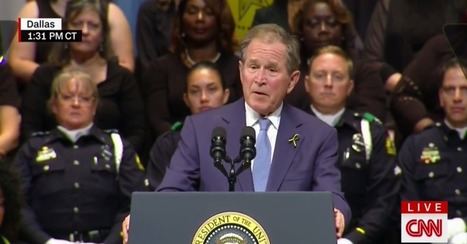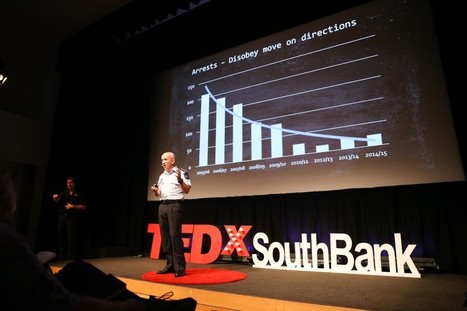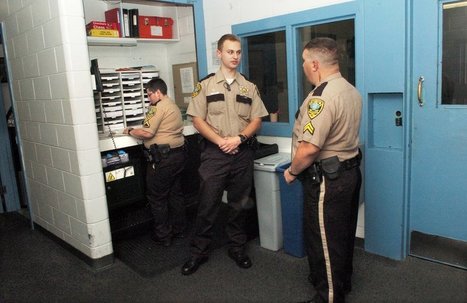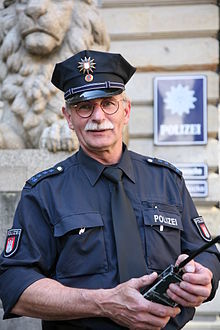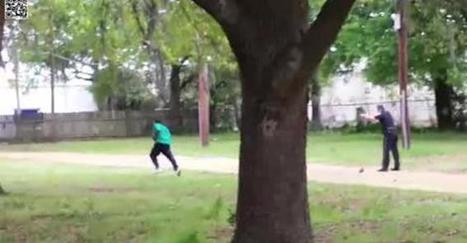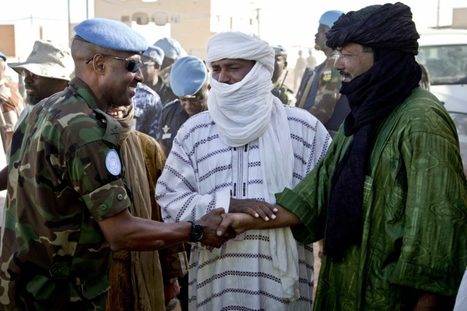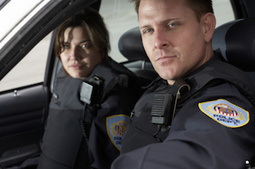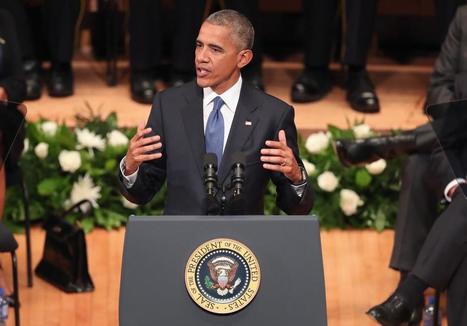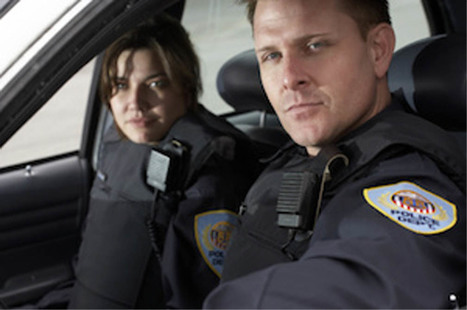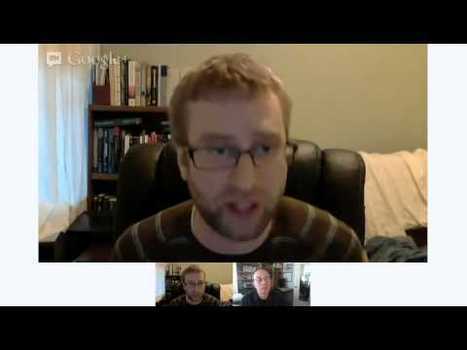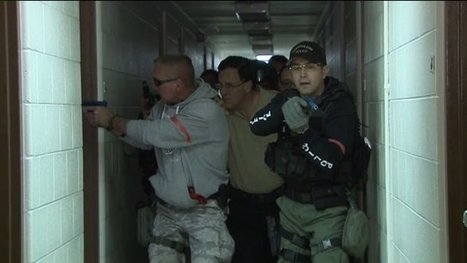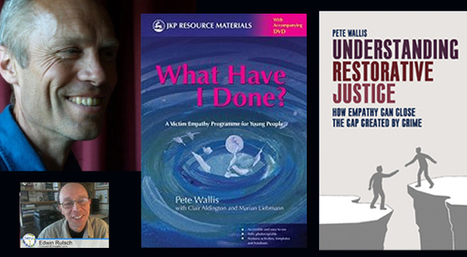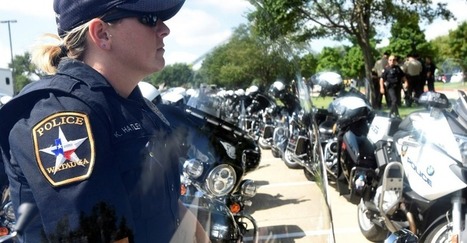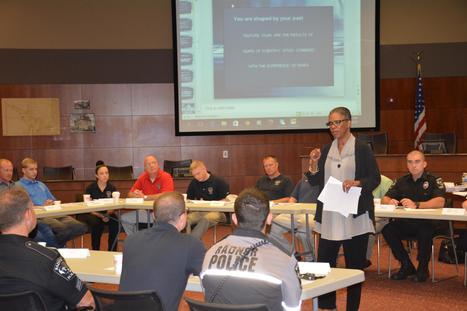 Your new post is loading...
 Your new post is loading...

|
Scooped by
Edwin Rutsch
June 16, 2017 12:06 AM
|
The term “community policing” has become such a buzz phrase that “Pretty much every department, if you ask them, would say they're doing community policing,” says Magnus,
“And I think most believe it. But the challenge is: is community policing really policing the community in the way that the community wants to be policed, or is it driven by the police department?”
Magnus' approach has been to build partnerships with the community at every opportunity, learning from the residents what their priorities are, in order to define where resources should go.
by Brad Marshland

|
Rescooped by
Edwin Rutsch
from Empathy Movement Magazine
May 29, 2017 11:21 PM
|
Conflict Frontiers Seminar: MOOS: http://www.beyondintractability.org/moos/frontiers-seminar
What does Hauss mean by long-term problem-solving? Well, it includes at least three things, empathy, reciprocity and trust. And each of those builds upon each other. So the more of one you have, the more the other that you can have. He adds that empathy is brought about by listening.
So instead of pushing “the other” out, you try to bring “the other” in by listening to them, developing empathy for them, understanding for their interests and needs.
That enables you to work together with them reciprocally to try to develop approaches that are best for everybody. And that helps develops trust. How do you do this? Well, one of the ways that you could do it is, look for what Hauss calls “positive deviance,” “bright spots” where people of either accidentally or on purpose have done something helpful to address the conflict or the wicked problem. Then you try to magnify those actions that have been helpful, replicate those actions, and help them grow into what he calls “virtuous cycles.”.. Instead of having things escalate so that tensions are getting higher and higher and problems are getting worse and worse, you build “virtuous circles,” where you solve a little bit, and that helps you solve more, and you build trust, and that helps you build relationships, that helps you build them empathy, and so on.

|
Rescooped by
Edwin Rutsch
from Empathy Movement Magazine
May 29, 2017 11:20 PM
|
Do you want to talk any more about empathy? I know that it is a topic that has concerned you considerably in the past.
Answer:
Well, it hasn't concerned me, but it's been paramount because my view is what we wrote in our textbook, what we found, what we learned, what we know is how you listen and the ability to listen is extremely important. That means listening, not only to obtain information, but with empathy. To reflect back to the other party is critical. It's critical in dealing with any emotional situation and virtually every civil rights conflict we entered a strong emotional component: anger, rage, disappointment, hurt, fear. To be able to listen with empathy, reflecting back to the party that you understand what they are saying and how they feel about it, not being critical, suspending judgment, not interrupting and those types of behaviors, all learnable skills, are absolutely critical to be consistently effective in this work. I remember John Chase telling me, when he was the regional director in Philadelphia, of a public housing case where the tenants were protesting over the construction of a highway through their neighborhood.... Empathic listening is the most important skill a mediator brings to this work.

|
Rescooped by
Edwin Rutsch
from Empathy Movement Magazine
May 29, 2017 12:23 AM
|
What does Hauss mean by long-term problem-solving? Well, it includes at least three things, empathy, reciprocity and trust. And each of those builds upon each other. So the more of one you have, the more the other that you can have. He adds that empathy is brought about by listening. So instead of pushing “the other” out, you try to bring “the other” in by listening to them, developing empathy for them, understanding for their interests and needs. That enables you to work together with them reciprocally to try to develop approaches that are best for everybody. And that helps develops trust. How do you do this? Well, one of the ways that you could do it is, look for what Hauss calls “positive deviance,” “bright spots” where people of either accidentally or on purpose have done something helpful to address the conflict or the wicked problem. Then you try to magnify those actions that have been helpful, replicate those actions, and help them grow into what he calls “virtuous cycles.”.. Instead of having things escalate so that tensions are getting higher and higher and problems are getting worse and worse, you build “virtuous circles,” where you solve a little bit, and that helps you solve more, and you build trust, and that helps you build relationships, that helps you build them empathy, and so on.

|
Rescooped by
Edwin Rutsch
from Empathy Movement Magazine
March 6, 2017 7:17 PM
|
Empathy has been found to undermine biased conflict perceptions.
Everyone interprets things through their own lenses, which filter information based upon our personal biases, beliefs, assumptions and values.Conflict is a fact of life and occurs for a variety of reasons, such as differing perspectives, priorities or solutions to a problem. Many believe that "misunderstanding is the cause of 90% of all conflict." Irrespective of the actual percentage, a great deal of conflict does stem from misunderstandings. Empathy and Relationships

|
Rescooped by
Edwin Rutsch
from Empathy Movement Magazine
September 24, 2016 1:40 PM
|
How might we improve police and community relations? This is a project to organize and host a series of Empathy Circles with Police Officers, Black Lives Matter and other Community Members. The best way for communities to come together is foster mutual and relational empathic dialog and understanding that results in shared action. We can start with a series of online Empathy Circles and then move towards hosting local community circles in larger groups.

|
Rescooped by
Edwin Rutsch
from Empathy Movement Magazine
July 20, 2016 1:23 AM
|
And this has strained our bonds of understanding and common purpose. But Americans have a great advantage. To renew our unity, we only need to remember our values. We have never been held together by blood or background. We are bound by things as the spirit, by shared commitments to common ideals.
At our best we practice empathy, imagining ourselves in the lives and circumstances of others. This is the bridge across our nation’s deepest divisions. And it’s not nearly a matter of tolerance. But of learning of the struggles and stories of our fellow citizens and finding our better selves in the process .

|
Rescooped by
Edwin Rutsch
from Empathy Movement Magazine
April 6, 2016 1:41 PM
|
Inspector Allen said the theme of the TEDx talk was ‘#challenge accepted’, with speakers expected to put a challenge out to their listeners.
“Police have always felt empathy, but now they do more than feel it—they act on it. My challenge was for other organisations to take on empathy and act on it. It might be out of the scope of their core business but it makes them better people,” he said.
Watch Inspector Allen’s talk below or visit TEDxSouthBank website here.

|
Rescooped by
Edwin Rutsch
from Empathy Movement Magazine
August 7, 2016 12:32 AM
|
Steven Dyer believes tuning in to other cultures prevents overreaction by police, but not all agree. ...Dyer is now exposing his students to a wide range of cultures, ideologies and viewpoints, an “empathy-based” approach that he hopes will prepare them for the diverse world they’ll face.... But so far he’s in a minority. Police officers and those involved in criminal justice education in Maine say the answer to current problems in law enforcement are simpler, and that empathy for other points of view won’t help. BY MADELINE ST. AMOUR

|
Scooped by
Edwin Rutsch
March 26, 2015 6:50 PM
|
Richmond police chief: 'All lives matter. That's really what community policing should be about.'
When Chris Magnus first moved to Richmond, Calif., in 2006, he would hear gunshots at night, sometimes very close to his house. That would be disturbing to anyone, but it was especially so to Magnus, as he had just been hired to be Richmond's new chief of police....
The term “community policing” has become such a buzz phrase that “Pretty much every department, if you ask them, would say they're doing community policing,” says Magnus, “And I think most believe it. But the challenge is: is community policing really policing the community in the way that the community wants to be policed, or is it driven by the police department?”
Magnus' approach has been to build partnerships with the community at every opportunity, learning from the residents what their priorities are, in order to define where resources should go.
by Brad Marshland

|
Rescooped by
Edwin Rutsch
from Empathy Movement Magazine
July 9, 2015 1:04 PM
|
EMPATHY TRAINING
The way law enforcement deals with the mentally ill has come under scrutiny following a spate of officer-involved shootings across the nation. But Hulse said news reports miss the success stories between law enforcement and the public they protect.
"We handle literally hundreds and hundreds of cases where everything went right and we de-escalated the individual and nobody got hurt," Hulse said.
Hulse said the training he administers to his officers is what stops crises and protects the public. But beyond that, he said empathy with people struggling is the real key to solving these issues.
Hulse hosts a voluntary crisis intervention training every year in April. He said a number of officers participate in the 40-hour training innovated by the Memphis Police Department.
The training, called the "Memphis Method" focuses on empathy with those having a mental health crisis.
image https://en.wikipedia.org/wiki/Police

|
Rescooped by
Edwin Rutsch
from Empathy Movement Magazine
April 20, 2015 11:58 AM
|
By now, no one is insulated from hearing about incidents of police shootings or violence against police officers. While fatal shootings are thankfully still rare events, this does not diminish the emotional impact of hearing about a violent death....
Right now, it might seem impossible to eliminate the us-versus-them mindset that permeates society, but optimistically, I do not think that we are at an impasse. What we have to do is look at a trait that all humans already possess: empathy.
Empathy: A basic human tool with great potential
Empathy has evolved in humans and other mammals over time. It allows us to understand the emotions of others and share in those emotions. Expressing empathy has many advantages: it increases cooperation (we like to help each other out when we feel that we are understood), reduces stress and it may even feel good.
by Chad Posick
Culture of Empathy Builder Page: Chad Posick http://j.mp/SRGxxu

|
Scooped by
Edwin Rutsch
September 21, 2016 12:27 PM
|
What Is CIT?
A Crisis Intervention Team (CIT) program is a model for community policing that brings together law enforcement, mental health providers, hospital emergency departments and individuals with mental illness and their families to improve responses to people in crisis. CIT programs enhance communication, identify mental health resources for assisting people in crisis and ensure that officers get the training and support that they need.
|

|
Rescooped by
Edwin Rutsch
from Empathy Movement Magazine
June 5, 2017 7:57 PM
|
Empathy Neuroscience: Translational Relevance to Conflict Transformation
October 18-19, 2017
Rome, Italy
This conference brings together empathy neuroscience research to tackle a key translational challenge: its relevance for conflict transformation. It focuses on the idea that taking the other person’s perspective is ultimately necessary to resolve conflict; and that conflicts are perpetuated by adopting a single perspective. The conference considers the relevance of empathy neuroscience for policy makers working in conflict transformation. The meeting will bring together an international panel of speakers drawn from outstanding scientists, clinicians, scholars, and charities, focusing particularly on the potential role of empathy in the Israel-Palestine conflict. The aim is to enable dialogue and a better understanding of empathy, and to promote the development of evidence-based interventions that foster empathy in conflict zones.

|
Rescooped by
Edwin Rutsch
from Empathy Movement Magazine
May 29, 2017 11:20 PM
|
Contents========== Introduction.
Empathy Defined .
Strategic Empathy as a Tool of Statecraft
International Relations Theory and Empathy
The Opening of China
American Policy in the Iraq War
Conclusion
Bibliography. by John Dale Grover October 2016 Empathy isn’t normally the first word that comes to mind when scholars write or talk about foreign policy, security, or grand strategy. In fact, if the word empathy was used in the same sentence as the phrases “foreign policy”, “security”, or “grand strategy”, one might be forgiven for assuming that the person using that word was either embarrassingly naïve or hopelessly radical. After all, empathy is a term that often carries with it emotionally warm or idealistic connotations that can also seem to include a desire to actively emotionally sympathize with or even aid whomever empathy is being practiced on. Such connotations and altruism do not readily make empathy a useful paradigm in foreign policy. It is well known that most foreign policy literature normally does not even consider empathy or else actively is hostile to the idea as being against the brutal realities of human nature or as dangerous to the national interest. Indeed, the only exceptions seem to be in the fields of international development, human rights and relief work, or conflict resolution and peace studies.

|
Rescooped by
Edwin Rutsch
from Empathy Movement Magazine
May 29, 2017 11:20 PM
|
Mutual Empathy
Mutual empathy is described as an "openness to being affected by and affecting another person."[15] This relational process involves both emotional and rational aspects. The element of respect is seen to play a critical role in fostering mutual empathy. The four major components of empathy include:
- The capacity for emotional response
- The mental capacity to take the perspective of the other
- The ability to regulate emotions
- The level of awareness of self and others[
Relational theorists emphasize the need for understanding that, just as disconnection is inevitable in relationships, experiencing empathic failure is unavoidable. Empathic failure, however, can lead to great reconnection if awareness, trust, and authenticity are present. [17]
Having empathic understanding does not imply only having positive emotions, but rather committing to a fuller understanding of one's own and another's experience.[18] The other is seen as a dynamic, whole being, rather than defined by a single attribute or action.

|
Rescooped by
Edwin Rutsch
from Empathy Movement Magazine
May 26, 2017 12:01 PM
|
Constructive dialogue with non-state armed groups is hugely important – to prevent, mitigate or resolve violent conflict. But it is equally challenging and variable in terms of the context, actors involved, purpose of such dialogue, and the means by which it is achieved. On 15 March 2017, Conciliation Resources and the Center for Empathy in International Affairs hosted a roundtable discussion involving 21 mediators, peacebuilders and experts to consider the role that empathy can play in helping to establish and sustain dialogue with non-state armed groups.
Our new briefing paper, Hard Feelings, published jointly with Conciliation Resources, summarises key insights from that discussion.
Roundtable participants included individuals from or affiliated with a range of institutions, including Conciliation Resources, the Center for Empathy in International Affairs, Chatham House, Concordis International, the Rift Valley Institute, Saferworld, the University of Kent, the University of Edinburgh, and the U.K. Foreign and Commonwealth Office. To read the full briefing paper click here. http://www.centerforempathy.org/wp-content/uploads/2017/05/CEIA-CR-Hard-Feelings.pdf

|
Scooped by
Edwin Rutsch
November 1, 2016 6:04 PM
|
Overall crime rates are down in the United States. But looking the news, it’s hard to not despair. Police killings of unarmed black citizens makes us question the integrity of our police forces, while retribution killings of innocent police officers make us fear for their safety on the job. According to a recent Gallop poll, confidence in the police has dropped to its lowest level in 22 years.
Yet, there is some hope. Social scientists have begun joining forces with police to look at how police communication protocols and training can be changed to help increase community trust for the police and reduce the use of force—and help them work together to fight crime.
While the research is largely preliminary, some of the findings suggest that empathy—being able to see interactions from another’s perspective and understand the emotions involved—may play an important role in policing .By Jill Suttie

|
Rescooped by
Edwin Rutsch
from Empathy Movement Magazine
July 20, 2016 1:24 AM
|
But then I am reminded of what the Lord tells Ezekiel. “I will give you a new heart,” the Lord says, “and put a new spirit in you. I will remove from you your heart of stone, and give you a heart of flesh.”
That’s what we must pray for, each of us. A new heart. Not a heart of stone, but a heart open to the fears and hopes and challenges of our fellow citizens.
That’s what we’ve seen in Dallas these past few days, and that’s what we must sustain. Because with an open heart, we can learn to stand in each other’s shoes and look at the world through each other’s eyes.
So that maybe the police officer sees his own son in that teenager with a hoodie, who’s kind of goofing off but not dangerous.

|
Rescooped by
Edwin Rutsch
from Empathy Movement Magazine
September 21, 2016 12:18 PM
|
New training programs that help police to listen, stay calm, and communicate during charged encounters may lead to fewer arrests and less use of force. While the research is largely preliminary, some of the findings suggest that empathy—being able to see interactions from another’s perspective and understand the emotions involved—may play an important role in policing. Helping police to slow down their encounters with the public and to practice more respectful and empathic communication could go a long way toward reducing excessive force and unnecessary arrests, leading to more acceptance of their presence and role in the communities they are hired to protect. By Jill Suttie http://greatergood.berkeley.edu/

|
Rescooped by
Edwin Rutsch
from Empathy Movement Magazine
March 26, 2015 7:27 PM
|
My associates and I have reviewed recent research and done some additional analyses to pin down what is currently known about empathy – and perceptions of empathy – in the realm of crime and justice. When other factors, like age, sex, race, education, and income are taken into account, empathy turns out to matter in several ways:
- Empathetic people are less likely to engage in delinquency or crime. But those who have trouble perceiving how others feel, and have difficulty sharing those feelings, are more likely to engage in wrongful acts – everything from minor juvenile delinquency to the most serious of violent crimes.
- Empathy affects how people think about crime and punishment in complex ways. People capable of empathy tend to support tough punishments for crime, but at the same time they are less likely to call for the harshest punishments, such as the death penalty.
- Empathy and perceptions of empathy help to shape the interactions of police and members of the communities they are assigned to protect. Research on citizen interactions with the police has consistently indicated that the way officers behave determines how they are evaluated by people with whom they interact. When we probe in detail, it turns out community members have more positive evaluations of the police when officers communicate that they understand the issues that matter to community members. Studies specifically show that the police are more likely to be trusted and considered effective at their jobs when they display empathy with the community’s concerns.

|
Rescooped by
Edwin Rutsch
from Empathy Movement Magazine
July 17, 2016 10:27 PM
|
He’s now a behavioral analysis expert, conducting training across the U.S. He says officers often don’t recognize the difference between someone who’s fearful and someone who’s threatening and empathy training could be a solution to some of the situations we’ve recently seen. But missing from training he says, is one very important component. “The officer has no training whatsoever on emotional awareness, empathy and compassion and how to manage own emotions,” Saraff said.
Saraff says in the 1970’s, the culture of law enforcement switched from guardians to warriors...
He does however, believe more empathy training could be a solution to some of the situations we’ve recently seen.

|
Rescooped by
Edwin Rutsch
from Empathy Movement Magazine
July 22, 2016 1:41 PM
|
"Victim empathy work helps them to acknowledge that it is real people that they have harmed. Empathy engenders a sense of shared experience, and an identification with and understanding of the other person's situation, feelings and motives. Empathy has the potential to profoundly change our interactions with one another." Pete Wallis is the senior practitioner in restorative justice for Oxfordshire Youth Offending Service. He has facilitated hundreds of restorative meetings and written or co-authored several books and articles on the subject including,
Understanding Restorative Justice: How Empathy Can Close the Gap Created by Crime and
What Have I Done?: A Victim Empathy Programme for Young People.
In 2011 he set up a charity to support young crime victims, and he is a consultant for the new Restorative Services Quality Mark.

|
Rescooped by
Edwin Rutsch
from Empathy Movement Magazine
July 17, 2016 10:35 PM
|
Scott G. Erickson Critics have suggested that much of the tension that shrouds police and community relations could be softened if only the police would better understand the unique experiences and worldview of those with whom they interact, particularly within communities of color.
This is absolutely true. Empathy is a vitally important element of effective policing. But to be truly effective, empathy must be shared and understood as a two-way street.

|
Rescooped by
Edwin Rutsch
from Empathy Movement Magazine
September 8, 2016 1:57 PM
|
Radnor police attend diversity seminar A couple of dozen Radnor police officers received new training Tuesday with an all-day diversity seminar that was conducted by a retired Pennsylvania State police officer and a member of the Rosemont College faculty... Another aspect of the training Brooks and Collins focused on the importance of having empathy for others.
“In life, no matter whom you are or where you are if you don’t have empathy you will never, ever be able to make an emotional connection with the people you are trying to impact or influence,” Brooks said. By Richard Ilgenfritz
|



 Your new post is loading...
Your new post is loading...

